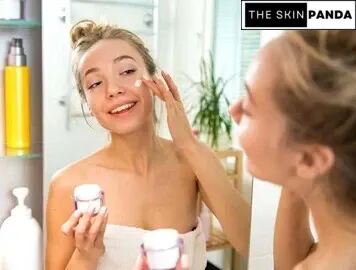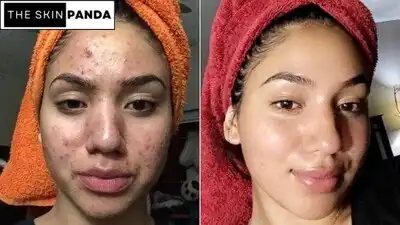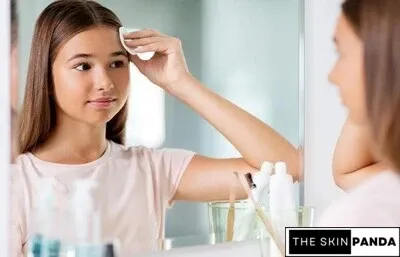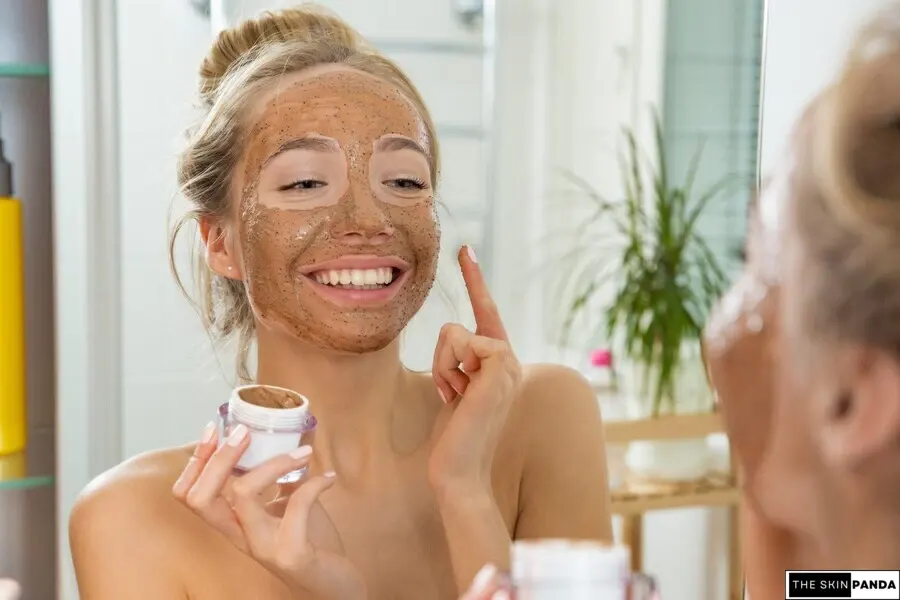Are you ready to kick start your journey to healthier, glowing skin? Discover the world of teenage skincare routine with our interactive guide! From understanding your unique skin type to building a personalized routine, we’ll empower you to make the best choices for your youthful complexion. Let’s get started!
The teenage years are a transformative period in a person’s life. It’s a time of self-discovery, growth, and, unfortunately for many, a battle with various skincare issues.
As adolescents transition from childhood to adulthood, their bodies undergo significant hormonal changes that can wreak havoc on their skin. Acne, oiliness, and sensitivity become all too familiar concerns.
However, the good news is that with the right knowledge and skincare routine, teenagers can lay the foundation for healthy, radiant skin that will last a lifetime.
As you read through, you will discover the world of teenage skincare, exploring the unique needs of adolescent skin, how to establish a proper skincare routine, and the essential do’s and don’ts for maintaining healthy skin during this crucial phase of life.
Whether you’re a teenager looking to enhance your skincare regimen or a parent guiding your child through this journey, this comprehensive guide will provide you with the insights and tips you need to achieve and maintain beautiful, clear skin throughout the teenage years and beyond.
What to Know About Teenage Skin
Teenage skin is a unique and constantly evolving entity. To effectively care for it, it’s crucial to understand the specific characteristics and challenges associated with this age group. Below are the characteristics of teenage skin and the role of genetics on skin health:
Hormonal Changes: Adolescence is marked by significant hormonal fluctuations. The surge in hormones, including androgens, can lead to increased sebum (oil) production. This excess oil can clog pores and contribute to issues like acne.
Common Skin Issues:
1. Acne: Acne is perhaps the most prevalent skin concern among teenagers. It can manifest as whiteheads, blackheads, pimples, or more severe forms like cysts. Hormonal changes and increased oil production often trigger acne outbreaks.
2. Oiliness: Due to hormonal changes, many teenagers experience excessive oiliness, especially in the T-zone (forehead, nose, and chin). This can make the skin appear shiny and contribute to clogged pores.
3. Sensitivity: Teenage skin can be sensitive and prone to redness and irritation. Harsh skincare products or environmental factors can exacerbate sensitivity.
Genetics plays a significant role in determining an individual’s skin type and its responses to various factors.
Teens may inherit their skin type and predisposition to certain skin issues from their parents. Knowing these genetic factors can help tailor a skincare routine to suit one’s unique needs.
In summary, teenage skin is characterized by hormonal fluctuations, common issues like acne and oiliness, and varying degrees of sensitivity.
Recognizing these traits is the first step in devising an effective skincare routine that addresses these challenges while promoting overall skin health.
Tips on Building a Teenage Skincare Routine

Establishing a proper skincare routine during your teenage years is essential for maintaining healthy, clear skin throughout adolescence and beyond.
Here’s a step-by-step guide to help you build an effective teenage skincare routine:
1. Cleansing
Choosing the Right Cleanser: Opt for a gentle, pH-balanced cleanser suitable for your skin type. Avoid harsh, drying cleansers, as they can strip the skin of essential oils.
Frequency of Cleansing: Wash your face twice a day – in the morning and before bedtime. Avoid over-cleansing, as it can lead to irritation and excessive dryness.
2. Exfoliation
Importance of Gentle Exfoliation: Exfoliation helps remove dead skin cells and unclog pores. Use a mild exfoliant with ingredients like salicylic acid or glycolic acid. Limit exfoliation to 1-2 times a week to prevent over-exfoliation.
Avoiding Over-Exfoliation: Over-exfoliating can cause skin irritation and worsen existing issues. Be gentle when exfoliating, and if your skin becomes red or overly sensitive, reduce the frequency.
3. Moisturizing
Hydration for All Skin Types: Regardless of whether your skin is oily, dry, or combination, moisturizing is essential. Choose a non-comedogenic, lightweight moisturizer that hydrates without clogging pores.
Non-Comedogenic Products: Look for products labeled as “non-comedogenic” to reduce the risk of breakouts.
4. Sun Protection
SPF Importance: Always wear sunscreen with at least SPF 30 during the day, even on cloudy days. UV exposure can worsen acne scars and cause premature aging.
Sunscreen Application Tips: Apply sunscreen generously to all exposed skin, including the face, neck, and ears. Reapply every two hours, especially if you’re outdoors.
5. Targeted Treatments
Acne-Fighting Ingredients: If you have acne-prone skin, consider products containing ingredients like salicylic acid or benzoyl peroxide. These can help prevent and treat breakouts.
Sensitive Skin Options: If your skin is sensitive, choose products with soothing ingredients like aloe vera or chamomile to calm irritation.
6. Developing a Routine Based on Skin Type
Oily Skin: If your skin is oily, focus on oil-free or mattifying products. Consider using a clay mask once a week to absorb excess oil.
Dry Skin: For dry skin, opt for richer, hydrating products. Use a hydrating mask occasionally to boost moisture levels.
Combination Skin: If you have combination skin, you may need to use different products on different areas of your face. Tailor your routine to address the specific needs of each zone.
By following these steps and customizing your skincare routine to your unique skin type and concerns, you can effectively manage teenage skin issues while promoting overall skin health.
Remember that consistency is key, and results may take time, so be patient and stick to your routine.
Skincare Routine for Teenage Acne

Teenage acne can be challenging, but with the right skincare routine, you can manage and improve the condition of your skin. Here’s a tailored skincare routine designed to help combat acne during your teenage years:
1. Cleansing:
Morning: Start your day by washing your face with a gentle, sulfate-free cleanser. This removes excess oil and impurities. Pat your face dry with a clean, soft towel.
Evening: Before bedtime, cleanse your face again to remove makeup, dirt, and accumulated oils. Cleanse gently to avoid over-drying your skin.
2. Exfoliation:
2-3 times a week: Use a mild exfoliant containing salicylic acid or glycolic acid. Exfoliation helps unclog pores and remove dead skin cells. Don’t overdo it, as excessive exfoliation can irritate your skin.
3. Acne Treatment:
Morning: Apply an acne treatment product containing benzoyl peroxide or salicylic acid. These ingredients help combat acne-causing bacteria and reduce inflammation.
Evening: Apply your acne treatment product again before bedtime. Consistency is key for effective acne management.
4. Moisturizing:
Use a lightweight, oil-free, non-comedogenic moisturizer. Even if you have acne-prone skin, it’s important to keep your skin hydrated. Look for moisturizers that won’t clog your pores.
5. Sun Protection:
Morning: Apply a broad-spectrum sunscreen with at least SPF 30. Acne treatments can make your skin more sensitive to the sun, and protecting it is crucial to prevent further damage and scarring.
6. Spot Treatment:
As needed: If you have individual acne spots, consider using a spot treatment with a higher concentration of acne-fighting ingredients. Apply it directly to the affected areas.
7. Avoid Touching Your Face:
Refrain from touching your face with your hands to minimize the spread of bacteria and prevent new breakouts.
8. Diet and Lifestyle:
- Maintain a balanced diet rich in fruits, vegetables, and whole grains. Limit sugary and processed foods.
- Stay hydrated by drinking plenty of water.
- Manage stress through relaxation techniques like meditation or yoga.
- Get enough sleep to allow your skin to regenerate.
9. Avoid Harsh DIY Remedies:
Refrain from using harsh homemade remedies like toothpaste or lemon juice on your acne. These can irritate your skin and worsen the condition.
10. Patience and Consistency:
Results may not be immediate, so be patient and consistent with your skincare routine.
Remember that it’s essential to consult with a dermatologist for severe or persistent acne. They can provide personalized guidance and may recommend prescription-strength treatments if needed. Your dermatologist can also help you avoid potential side effects and ensure you’re using the right products for your skin type.
Skincare Routine for Teenage Guys

Teenage guys often face unique skincare challenges due to hormonal changes, increased oil production, and the need for simplicity. Here’s a straightforward skincare routine tailored for teenage boys:
1. Cleansing:
Start your day by washing your face with a gentle, sulfate-free cleanser. This removes excess oil, dirt, and sweat from overnight.
Before bedtime, cleanse your face again to get rid of the day’s impurities. Cleansing helps prevent breakouts and maintain clear skin.
2. Exfoliation:
2-3 times a week: Use a mild exfoliant containing salicylic acid or glycolic acid. Exfoliation helps unclog pores and remove dead skin cells. Don’t over-exfoliate to avoid irritation.
3. Acne Treatment (if needed): If you have acne-prone skin, apply an acne treatment product containing benzoyl peroxide or salicylic acid. Focus on problem areas, and remember that consistency is key.
4. Moisturizing:
Use a lightweight, oil-free, non-comedogenic moisturizer: Even if your skin is oily, it’s crucial to keep it hydrated. Look for a moisturizer that won’t clog pores.
5. Sun Protection:
Morning: Apply a broad-spectrum sunscreen with at least SPF 30 before heading out. Sunscreen is essential to protect your skin from sun damage and premature aging.
6. Shaving Routine:
- If you shave, use a gentle shaving cream or gel and a clean, sharp razor.
- Shave in the direction of hair growth to minimize irritation.
- After shaving, apply a soothing, alcohol-free aftershave or moisturizer.
7. Healthy Lifestyle:
- Maintain a balanced diet with plenty of fruits, vegetables, and whole grains. Limit sugary and processed foods.
- Stay hydrated by drinking water throughout the day.
- Get enough sleep to allow your skin to regenerate.
- Manage stress through physical activity and relaxation techniques.
8. Hygiene:
Change pillowcases and bed linens regularly to prevent the buildup of oils and bacteria.
Keep your hair clean and avoid letting hair products come into contact with your face, as they can contribute to breakouts.
9. Avoid Harsh DIY Remedies:
Refrain from using harsh homemade remedies like toothpaste or baking soda on your skin, as they can be too abrasive and cause irritation.
Morning Skincare Routine for Teenagers

Starting your day with a proper skincare routine not only helps you feel fresh but also sets the stage for healthy skin throughout the day. Here’s a morning skincare routine tailored for teenagers:
Step 1: Use a Gentle Cleanser: Start your morning routine by cleansing your face with a mild, sulfate-free cleanser. This helps remove any oils, sweat, or impurities that have built up overnight.
Step 2: Apply a Lightweight Moisturizer: After cleansing, apply a lightweight, non-comedogenic moisturizer suitable for your skin type. This helps maintain your skin’s hydration and balance throughout the day.
Step 3: Apply Sunscreen: Sunscreen is a must, even on cloudy days. Choose a broad-spectrum sunscreen with at least SPF 30. Apply it generously to all exposed skin, including your face, neck, and ears. Make sure to let it absorb fully before moving on to makeup (if you wear it).
Step 4: If you wear makeup, you can apply it after sunscreen. Ensure your makeup products are non-comedogenic and, if possible, contain SPF for added sun protection.
Step 5: Don’t forget to apply a lip balm with SPF to protect your lips from the sun’s harmful rays.
Step 6: Drink a glass of water to stay hydrated from within. Hydration is crucial for healthy skin.
Step 7: Throughout the day, try to avoid touching your face to prevent transferring dirt and bacteria from your hands to your skin.
Step 8: Follow a balanced diet, exercise regularly, and get enough sleep to support your skin’s overall health.
Step 9: Consistency is key for skincare. Stick to your morning routine daily for the best results.
This morning skincare routine is designed to be simple, quick, and effective for teenagers. It helps protect your skin from the sun, keeps it hydrated, and sets a healthy foundation for the day ahead.
If you have specific skincare concerns or issues, consider consulting a dermatologist for personalized advice.
Night Skincare Routine for Teenagers

A nighttime skincare routine is essential for teenagers to repair and rejuvenate the skin after a day of exposure to environmental pollutants and stress.
Here’s a simple and effective night skincare routine for teens:
Step 1: Use a Gentle Cleanser: Start your nighttime routine by washing your face with a gentle, sulfate-free cleanser. This removes makeup, sunscreen, dirt, and excess oil.
Step 2 (if applicable): Apply Acne Treatment: If you have acne-prone skin, apply an acne treatment product containing benzoyl peroxide or salicylic acid. Focus on areas with active breakouts.
Step 3: Apply Moisturizer: After cleansing, apply a lightweight, non-comedogenic moisturizer suitable for your skin type. This helps maintain your skin’s hydration overnight.
Step 4: Don’t forget to apply a lip balm to keep your lips hydrated while you sleep.
Step 5: Drink a glass of water before bedtime to stay hydrated from within.
Step 6: Aim for 7-9 hours of quality sleep each night. A good night’s sleep is essential for skin repair and overall health.
Step 7: Ensure your pillowcases and bed linens are clean. Changing them regularly helps prevent the buildup of oils and bacteria that can lead to breakouts.
Step 8: Avoid touching your face throughout the evening to reduce the risk of transferring dirt and bacteria to your skin.
Step 9: Engage in relaxation techniques, such as deep breathing or light stretching, to unwind before bedtime and reduce stress.
Step 10: Consistency is key in skincare. Stick to your nighttime routine consistently to see the best results.
This nighttime skincare routine is straightforward and focused on cleansing, moisturizing, and maintaining overall skin health.
Harmful Practices in Teen Skincare to Avoid

When it comes to skincare, it’s equally important to know what not to do as it is to follow a proper routine. Here are some harmful practices to avoid to ensure the health and well-being of your skin:
1. Picking or Popping Pimples:
As tempting as it may be, picking at pimples or popping them can lead to scarring, infection, and the spread of bacteria. It’s best to leave blemishes alone or seek professional help from a dermatologist.
2. Harsh DIY Remedies:
Avoid using harsh DIY remedies like toothpaste, baking soda, or lemon juice on your skin. These can be too abrasive and cause irritation or worsen skin issues.
3. Sharing Skincare Products:
Sharing skincare products, especially applicators like makeup brushes, can transfer bacteria and lead to breakouts or infections. Use your own products and clean applicators regularly.
4. Skipping Skincare Routine:
Consistency is key to achieving and maintaining healthy skin. Skipping your skincare routine can disrupt progress and lead to unwanted skin issues.
5. Over-Exfoliating:
Exfoliation is important, but over-exfoliating can irritate your skin and compromise its protective barrier. Stick to the recommended frequency for exfoliation (usually 2-3 times a week) and choose gentle exfoliants.
6. Using Harsh, Drying Products:
Avoid skincare products that contain harsh ingredients, high levels of alcohol, or excessive fragrances, as these can strip your skin of its natural oils and cause dryness or irritation.
7. Neglecting Sunscreen:
Skipping sunscreen can lead to sun damage, premature aging, and an increased risk of skin cancer. Make sunscreen a daily habit, regardless of the weather.
8. Sharing Makeup:
Sharing makeup, especially eye and lip products, can spread infections like conjunctivitis or cold sores. Invest in your own makeup and avoid sharing it with others.
9. Not Removing Makeup Before Bed
Sleeping with makeup on can clog pores, lead to breakouts, and cause skin irritation. Always remove makeup before bedtime using a gentle makeup remover or cleansing routine.
10. Using Dirty Makeup Brushes:
Dirty makeup brushes can harbor bacteria that may lead to skin issues. Clean your brushes regularly with mild soap or brush cleaner.
By avoiding these harmful practices and following a proper skincare routine, you can ensure the health and beauty of your skin while reducing the risk of skin problems and long-term damage.
Tips for Maintaining Healthy Skin as a Teen

Maintaining healthy skin during your teenage years is crucial not only for immediate appearance but also for long-term skin health.
Here are some essential tips to help you achieve and preserve clear and radiant skin:
1. Develop a Consistent Skincare Routine: Establish a daily skincare routine that includes cleansing, moisturizing, and sun protection (morning) cleansing, moisturizing, and, if needed, acne treatment (evening).
2. Identify Your Skin Type: Determine your skin type (e.g., oily, dry, combination) to select products that suit your specific needs. Tailor your routine accordingly.
3. Avoid Touching Your Face: Minimize touching your face with your hands. This reduces the transfer of dirt and bacteria from your hands to your skin, helping prevent breakouts.
4. Stay Hydrated: Drink plenty of water throughout the day to maintain skin hydration. Hydrated skin is more resistant to dryness and flakiness.
5. Eat a Balanced Diet: Consume a diet rich in fruits, vegetables, whole grains, and lean proteins. Avoid excessive sugary and processed foods that can contribute to skin issues.
6. Protect Your Skin from the Sun: Always wear sunscreen with at least SPF 30 when you’re outdoors. Sunscreen protects your skin from harmful UV rays and prevents premature aging.
7. Manage Stress: Stress can exacerbate skin problems. Practice stress management techniques like meditation, deep breathing, or yoga to keep your skin and mind healthy.
8. Get Adequate Sleep: Aim for 7-9 hours of quality sleep each night. Sleep is essential for skin repair and regeneration.
9. Exercise Regularly: Physical activity promotes healthy circulation and can contribute to clearer skin. Just remember to cleanse your face after a workout to remove sweat and oil.
10. Avoid Smoking and Excessive Alcohol: Smoking and excessive alcohol consumption can harm your skin’s health and appearance. Avoid or minimize these habits.
11. Be Gentle with Your Skin: Avoid harsh scrubbing and excessive exfoliation, which can irritate your skin. Use gentle, circular motions when applying skincare products.
12. Keep Clean Bedding: Change your pillowcases and bed linens regularly to prevent the buildup of oils and bacteria that can contribute to breakouts.
13. Consult a Dermatologist: If you have persistent or severe skin issues, consult a dermatologist. They can provide professional guidance and treatments tailored to your needs.
People Also Ask (FAQs)
Question 1. Should a 14-year-old have a Skincare Routine?
Answer: Yes, a 14-year-old can benefit from a simple skincare routine. It helps develop healthy habits, addresses common teen skin issues, and promotes self-care at an early age. Starting with a gentle cleanser, moisturizer, and sunscreen is a great foundation for lifelong skincare.
Question 2. What Skincare should a 14-year-Old use?
Answer: A 14-year-old’s skin care should focus on simplicity and gentle products. Start with a mild cleanser to remove dirt and sweat, followed by a lightweight, non-comedogenic moisturizer to maintain hydration. Sunscreen with at least SPF 30 is essential to protect young skin from harmful UV rays.
Question 3. Should a 15-year-old do Skincare?
Answer: Yes, skincare is important for a 15-year-old. It helps manage common teenage skin issues like acne, promotes healthy habits, and safeguards against sun damage. A basic routine including cleansing, moisturizing, and sunscreen can lay the foundation for a lifetime of good skincare practices.
Question 4. Can 15-year-old use Serum?
Answer: Yes, a 15-year-old can use a serum, but it should be chosen carefully to suit their specific skin needs. Look for a gentle, hydrating serum with ingredients like hyaluronic acid or antioxidants to address concerns like dryness or uneven skin tone. Always consult with a dermatologist for personalized recommendations.
Question 5. Can a 15-year-old Use Face Scrub?
Answer: Yes, a 15-year-old can use a face scrub, but it should be done sparingly and with caution. Opt for a mild, exfoliating scrub and use it no more than 2-3 times a week to prevent irritation and over-exfoliation. Always follow with a moisturizer to keep the skin hydrated.
Question 6. Can a 14-year-old use Multani Mitti?
Answer: Yes, a 14-year-old can use Multani Mitti (Fuller’s Earth) as a skincare ingredient, but it should be used in moderation and with proper dilution. Multani Mitti can help control excess oil and acne, but it may be drying, so it’s essential to moisturize afterward. Always perform a patch test and consult with a dermatologist if there are any concerns about skin sensitivity or allergies.
Question 7. Which Face Wash is best for 15 year girl?
Answer: The best face wash for a 15-year-old girl should be gentle, sulfate-free, and suited to her skin type. Look for a mild cleanser with ingredients like salicylic acid for acne-prone skin or hydrating ingredients for dry skin. Consulting with a dermatologist can provide personalized recommendations based on her specific skincare needs.
Question 8. Can 14-year-olds use Vitamin C Serum?
Answer: Yes, a 14-year-old can use a vitamin C serum, but it should be used cautiously and in moderation. Vitamin C can help with skin brightening and collagen production, but it’s essential to choose a gentle formula and consult with a dermatologist for proper usage guidelines, especially for young and sensitive skin.
Question 9. How to know my Skin Type?
Answer: Determining your skin type is simple: after washing your face, wait an hour without applying any products. If your skin feels tight, dry, and flaky, it’s likely dry. If it’s oily with shine and enlarged pores, it’s oily. If it’s a mix of both, you have combination skin. Normal skin feels balanced, neither too oily nor too dry, and rarely experiences breakouts.
Question 10. When should I Start Skincare?
Answer: Starting skincare is a personal choice, but a basic routine can begin in the early teens to establish good habits. By age 12-14, a simple regimen including cleansing, moisturizing, and sunscreen helps manage teenage skin changes and promotes lifelong skin health. Always consult with a dermatologist for specific recommendations based on your skin type and concerns.
Conclusion
As a teenager, taking care of your skin is not only about looking good but also about fostering lifelong healthy habits. Your skin is a reflection of your overall well-being, and by following a consistent skincare routine and adopting healthy lifestyle practices, you can enjoy clear, radiant skin well into the future.
Understanding your skin type, avoiding harmful practices like picking at blemishes or skipping sunscreen, and embracing a balanced diet and hydration are crucial steps in achieving and maintaining healthy skin.
Additionally, managing stress, getting enough sleep, and staying physically active all contribute to your skin’s health and vitality.
Remember that skincare is a journey, and results may not always be immediate. Patience and consistency are your allies in this pursuit.
If you encounter persistent skin issues or have questions about your skincare routine, don’t hesitate to consult a dermatologist who can provide expert guidance and personalized recommendations.
In the end, healthy skin is a reflection of your overall self-care and self-esteem. Embrace your natural beauty, be kind to your skin, and take pride in your commitment to maintaining healthy, radiant skin for years to come.
Your teenage years are the perfect time to establish these lifelong habits, setting the stage for a future of skin confidence and well-being.
Disclaimer
The content provided is for informational purposes only and should not be considered a substitute for professional advice. Always consult with a qualified expert for specific concerns. Any product or brand mentions in our content do not imply endorsement. We do not endorse or promote specific products or services unless explicitly stated.
